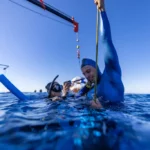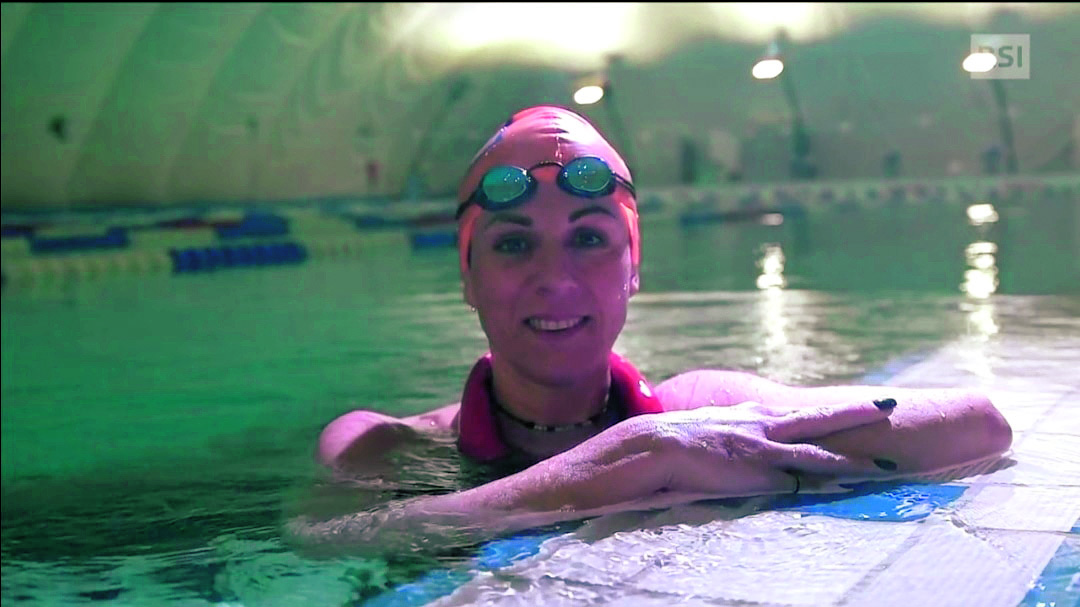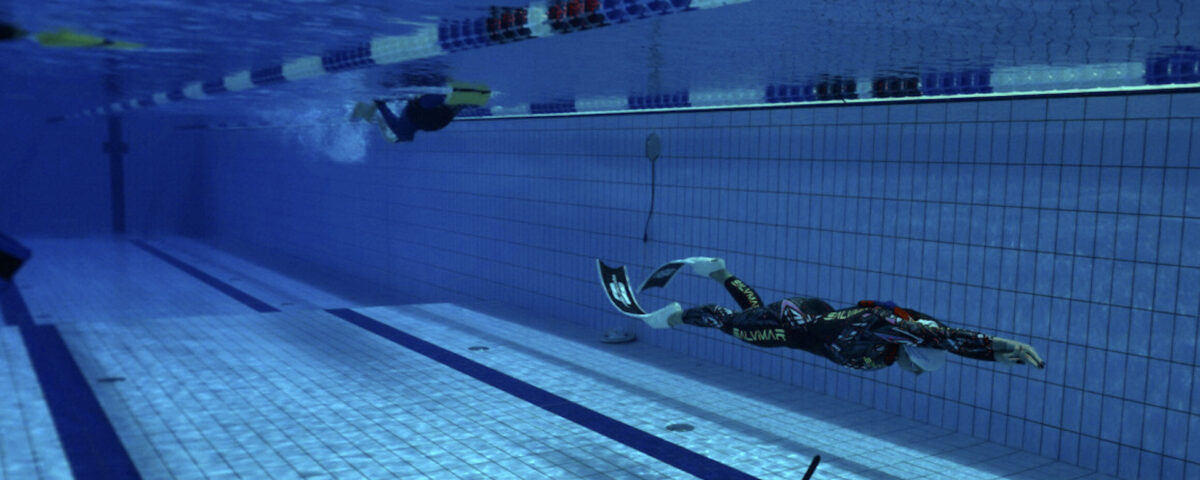Cristina Francone: A War Machine!

Kas World Championship
11 September 2023She approached competitive freediving at the age of 44 and quickly climbed the rankings. In this chat, she tells us about the difficulties of balancing competitions and training while working as a nurse and caring for her two children. She also shares her desire to "sweat" and put effort into what she does. photos by Tatjana Skobo
By Stefano Tovaglieri
"There are no limits to the potential we can express, just by making certain life choices," Cristina Francone said at the World Apnea Symposium in Lignano Sabbiadoro last December. In this statement lies Cristina's entire world: a mother, a worker, and a high-level athlete, as she herself emphasized. It was a pleasure to meet her on that occasion and even more so to interview her. First of all, it should be mentioned that Cristina embarked on competitive freediving at the age of 44; shall we say, not exactly in her youth! Nevertheless, she brought years of competitive experience, training in fin swimming, and above all, a dream. A dream she had as a child, seeing herself on top of the world for achieving something great, something no one had ever done before: a world record! That's how she decided to challenge herself again. She returned to compete with the fin swimming masters. The spark ignited when she met Angelo Sciacca and Martina Mongiardino during an endurance race; the one-hour race! "It seemed so absurd to me that those athletes held their breath for all those laps." But then, in December 2018, she decided to approach the discipline and met Fabio Benevelli, who became her coach and later her husband. In February 2019, just 3 months later, she started competing in dynamic apnea, "that long thing that never ends," which initially led her to say, "I'll never do it!" Cristina made her debut in the elite, ending her first competition at a remarkable 212 meters! From that point on, everyone in the world of freediving, especially indoor freediving, started talking about her. Here's what she told us: "I've been involved in sports since I was a child (I started at 4 years old with swimming lessons and at 10 with competitions): my dream was to "set a world record." I never thought about titles or anything else; I wanted to reach where no one else had reached before. That was my true desire. In the first year of freediving, I realized that, partly due to my sports background and perhaps also due to predisposition, this dream could be transformed into a project, and then into reality."
What values have guided you to this day?
"Love for sports, fundamentally. I grew up in a family where sports were respected as much as education. My parents never kept me from training and competitions because I had to "study" or to punish me for low grades at school. Sports were an integral part of my upbringing and as such required commitment and organization (I remember studying at night because I trained during the day). Other fundamental values are commitment and professionalism: for me, hard work and some sacrifices are very motivating. What I sweat for gives me the greatest satisfaction."
What do you like most about freediving?
"Fundamentally, it's a way of struggling that is very different from what I have always known and practiced. Every sport has its mental and emotional challenges, but in freediving, these aspects are really demanding, especially because they play a significant role in performance. As I said: I appreciate what requires more effort. I approached freediving at a particular moment in my life, very chaotic and stressful. Today, I recognize that "putting my head underwater" was beneficial, not only in terms of physical achievements but also for my health, especially my mental health..."
What is your favorite specialty in indoor freediving?
"I started in December 2018 with Endurance, specifying to my newly appointed coach Benevelli that I would never do "that long and slow underwater thing." As they say, "never say never"! In February, I had already changed my mind and started getting passionate about dynamic apnea, but "exclusively with the monofin, because long fins, I told myself, can't be serious equipment!" Once again, a couple of months later, I retracted what I had said and found myself changing my mind and wanting to invest in long fins to better define the boundaries of my dream. Today, I'm attached to both tools (monofin and long fins), but when I dream, I always have long fins on my feet."
And in outdoor freediving? Do you have plans for the sea in the future?
"For now, I practice outdoor freediving exclusively for pleasure, after the indoor season, whenever there is an opportunity. In Genoa, we organize recreational outings in Haven. Outdoor freediving is a world that is far from my responsibilities of coordinating work and family, both logistically and in terms of time. So, for now (but never say never), depth freediving is purely recreational."
Cristina Francone: athlete and freediver, but also a woman, worker, and mother. What does it mean to be all of this for you?
"As I mentioned, I grew up learning to organize myself to make very different aspects of my daily life work, even at quite high levels. Many people ask me how I manage it, but honestly, I don't know any other dynamics of life. It's my normal; my daily routine includes various and demanding activities that I believe complement each other, so none of them takes away from the others. On the contrary, they somehow regenerate the invested energies. My children share and appreciate this lifestyle of ours."
What do obstacles and difficulties mean to you and what do they represent?
"They are stimuli. Of course, they must be commensurate with the available energies of the moment and therefore surmountable; at least in theory! Only in this way do they become challenging, and I find the desire to confront them. Easy victories are not my mood; I prefer to sweat to achieve my goals."
Is there a dominant thought that occupies your mind before competitions?
"Yes, and it's no joke! I genuinely wonder: why don't I just do aquagym like all the women my age? But then, at "minus 3 minutes," everything resets; my mind calms down, and I focus on the pool, the water, and the sensations the liquid element will give me."

Could you tell us about a typical day of a mother who trains in indoor freediving? How many sessions, what times, what training volume...
"My day, as a nurse, usually starts early. I wake up at 6 am and start working between 7 and 8 am. The kids usually leave home with me, or shortly after, to go to school. My shift ends at around 5 pm (thankfully, I have a specific assignment that allows me to have fairly stable working hours and days), at which point I pick up the kids from school, and we divide ourselves between various sports activities (they do karate and swimming). The day ends at around 9 pm when we finally have dinner together, then it's time for bed. Obviously, almost zero time for television and social media... for us, the most significant relationships are still the ones in person, with teammates and friends.
As for the training plans, they depend on the period. Usually, I have 5 training sessions per week, almost exclusively in the water. If there's an unforeseen circumstance preventing me from going to training, I replace it with a dry session at home. Out of these weekly sessions, one or two at most are dedicated to freediving. The training volumes in water are sinficant, asI train with the Ticino fin swimming team and it's quite demanding."
What is your vision of competitive freediving in the coming years?
"Let me clarify: we're only talking about competitive freediving here. In that case, I hope it becomes a full-fledged sport. It would be nice not to hear those poolside remarks like, "imagine, I did x meters without training," as if training and effort were not fundamental values of freediving. Hearing such things doesn't help; I consider it disrespectful towards athletes who dedicate themselves to it with sacrifice and dedication, as in my case and many others. I believe we are only at the beginning of the discipline, and the true limits will only be glimpsed when a truly "sportsmanlike" attitude emerges. Training always pays off! In swimming, for example, who would dream of saying, "I swim the 100m freestyle in one minute and ten seconds, and I only train once a week"? Would that be something to boast about? Of course not! Advanced preparation methodologies are already being developed. I believe that the opportunity to compare and exchange experiences and experiment is fundamental. However, to achieve all this, we must be open to change. We must have the courage to leave the comfort zone of "it has always worked this way" and try other methods. Never worry about judgments or possible setbacks and mistakes. Personally, if you allow me a metaphor, I prefer to be a flowing stream with rapids and waterfalls rather than a stagnant pond."
What advice would you give to a young woman who wants to get into the world of competitive freediving?
"Do it, go for it, experiment, but above all, listen to yourself much more than listening to others. At the beginning, I received advice and "this is how it's done" from so many people. Of course, I know that everyone meant well with their best suggestions. But it has somewhat polluted my personal interpretation and vision of freediving. I listened to them, and in this way, partly voluntarily and partly unconsciously, I distorted my experience of freediving. It was then difficult to find the “naturalness” and pleasure, something that used to come instinctively to me."
This year, the World Indoor Championship will be held in Kuwait. Will you be there? What do you think about women's sports in Islamic countries, and what's happening in Iran?
"I am preparing for the season to the best of my abilities; the selection criteria are quite demanding, especially since the world championship will be in early May. But above all, Stefano, this is not a question to ask an athlete.
As for the second part of the question, sports have always been a tool of emancipation, expression, and freedom. The real revolution will happen when being a mother, worker, and athlete will not be something new, but will just be the norm, just like it already is for men. Without looking at Islamic countries, which I don't know enough about to make judgments, I believe that in general, practicing sports as a woman is still more complicated than for a man. There are still many deeply rooted prejudices. We live in a society that too easily stigmatizes mothers who invest time and energy in their careers (sports) rather than exclusively on their children."


